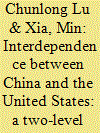| Srl | Item |
| 1 |
ID:
099678


|
|
|
|
|
| Publication |
2010.
|
| Summary/Abstract |
This paper constructs a two-level model to explain China-U.S. relations. We find that at the state level, the interdependence between China and the United States, which comes from their bilateral trade and foreign direct investment, is asymmetric. Such asymmetric interdependence favors the United States in pushing the Chinese government to make concessions when they have conflicts. However, at the society level, China can penetrate into American society to intervene or influence American foreign policymaking. In this paper, it is argued that the outcome of China-U.S. relations is determined not only by the asymmetric interdependence at the state level or societal penetration respectively, but also by the interaction of these two factors in the process. Finally, the new development of China-U.S. relations since the inauguration of the Obama administration is also examined.
|
|
|
|
|
|
|
|
|
|
|
|
|
|
|
|
| 2 |
ID:
109124


|
|
|
|
|
| Publication |
2011.
|
| Summary/Abstract |
This article examines the impacts of two types of social capital - bonding and bridging - upon the performance of grassroots selfgovernment institutions in rural China, based on an original survey of 410 villages throughout the whole of China. The findings indicate that, on the one hand, bonding social capital still has a very solid foundation in the rural areas of China. On the other, bridging social capital is in formation in Chinese villages, even though the stock of bridging social capital is currently very moderate. Moreover, this study finds that bridging social capital, as manifested in general trust and inclusive social networks, positively affected the governance performance of each surveyed village. Yet, bonding social capital, as manifested in particular trust and exclusive social networks, tends to negatively impact the performance of Chinese rural governance. These findings help clarify some theoretical issues about, and shed some light on the prospects of, the rural self-governance system in China.
|
|
|
|
|
|
|
|
|
|
|
|
|
|
|
|